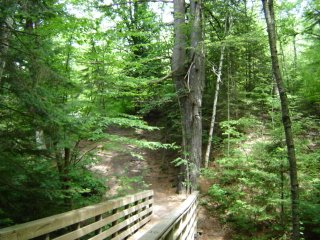Nature, Raw and Beautiful

What a day, an almost-cerulean sky above, with cotton-candy-tufted clouds drifting by, slight breeze, cooler temperature. As though we need an incentive to delve into our nearby ravine for our usual jaunt. Hard by the collective mailboxes near the street-entrance to the ravine, trailing lotus brighten the landscape, yellow against the bright blue of the cornflowers (chicory). The wind bends the tall grasses, moves the long fronds of the sumachs, rustles the leaves of the maples, poplars, gently moves the tall spires of the fir and spruce.
We hear the outraged chittering of a red squirrel high up in its tree, obviously unhappy at our intrusion on its territory. The ravine has taken on a dry, almost bleak and ravaged look, post-storm. That should really read in the plural, as we've had more than one very serious storm in terms of briskly high winds, volume of rainfall, leaving fallen trees, hillsides scraped and runnelled, the creek full of heavy pieces of woodland detritus. The thrust of the swollen creek rushing by at full throttle at the height of the storm had broken off huge chunks of pure clay from the sides of the creek, and they lay there now, littering the creek bed, raising the level of the bed at its centre, so the creek, now running low passes on either side of the middle.
Further on, into the ravine, we see jewel-weed in the perpetually wet portions; in the more open sectors tall fall asters, Queen Anne's lace vying for height with helianthus: ivory, white, gold. Thimbleberry flowers (purple raspberries) lend a gay bright colour, as does clover, cowvetch and gotcha! the first of the raspberries to ripen, deep dark, invitingly-luscious red. They look better, alas, than they taste, although their fragrance is divine.
We hear the high-pitched regular thrumming of cicadas. Incredible how loud those relatively small creatures can sound. Recalling what it was like in Tokyo, where every summer cicadas arrive in great numbers and raise a continual racket with no surcease. But we also hear the shrieks of the sharpshinned hawks wheeling high above, and crook our heads, shielding our eyes from the blazing sun, to observe them. Despite their relatively modest size for a hawk, these raptors have the reputation of hitting beyond their size, preying on birds as large as pigeons. No great loss, says my husband.
But on yesterday's hike through the ravine we came across an old acquaintance whom we occasionally see with his dog, and he related an interesting story to us. Evidently, two weeks earlier, roughly the same time we began to notice the presence of the hawks, a very old oak which had formerly been their home, had been cut down. The oak stood at the edge of the ravine on the street where our old friend lives. It was a majestic, much-admired tree, but it was evident that it hadn't much longer to live. Arborists employed by the city had determined it had to come down, and so it was removed. One of our friend's neighbours used to complain that he would constantly find small, seemingly inedible bird- and mammal-bits discarded into his pool from its site close by this old oak.
Moreover, he said, he noticed that the population of mourning doves had steeply declined, and he has no doubt whatever that was the work of the hawks. Doves, after all, are slow-flying birds, likely incapable of putting up any kind of defence against a relentless hunter. That is sobering news, although we knew in a more abstract manner that this is what we could expect with the presence of these most interesting of birds close to the portion of the ravine where we live. We now feel we may see a reduction in the number of small mammals and birds that we normally come across during our walks, and feel great regret over that. It's a shrug of nature.
Now, crossing over the last of the bridges criss-crossing the now-reduced creek we note that the long rope that teen-age boys had succeeded in looping over the trunk of an old willow which swooped over the creek is still there, complete with handling stick whereby the boys would grasp either side of the stick and swing themselves from one bank to the other, hoping they wouldn't loose their grasp and fall in. To much derision and laughter by those looking on, presumably. They installed a short rustic "ladder" and embedded it into the clay bank to enable themselves to scramble up the wet clay should they experience the misfortune of falling into the creek. Nothing like the ingenuity of kids, entertaining themselves in the great out of doors.
No true symmetry in nature, though there is her balance.

<< Home